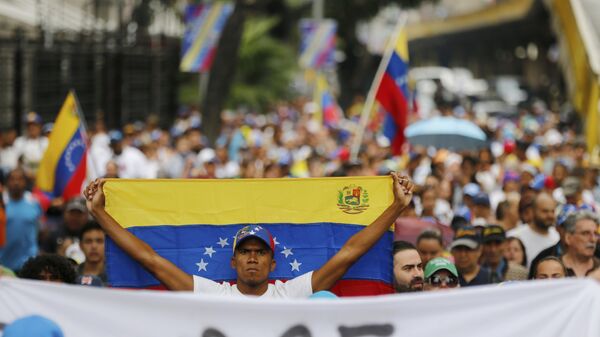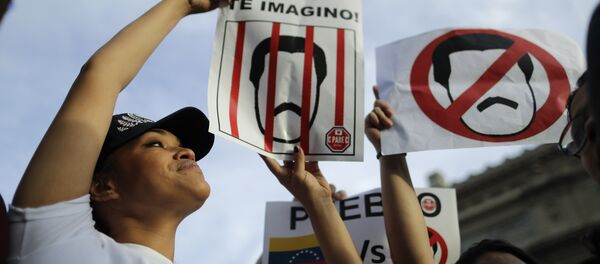Last week, the US, along with a number of allies including Paraguay, Argentina, Guatemala, Peru and Canada, declared Venezuelan opposition leader Juan Guaido as the legitimate leader of the South American country, despite protests from Venezuelan President Nicolas Maduro. The move came after Guaido declared himself interim president on Wednesday.
However, in the following hours, Venezuelan Defense Minister Vladimir Padrino took to Twitter, announcing that the Venezuelan military wouldn't accept an imposed or self-proclaimed president. He stressed that servicemembers would continue to defend the Venezuelan constitution and act as a guarantor of national sovereignty.
"This is like amateur hour at the State Department and the White House," Kaufman told Radio Sputnik's Loud & Clear on Monday. "How could they have thought this tactic would work? Without the support of the military, you can't have a coup in the first place."
"The Trump administration wasn't able to get the majority of Organization of American States to endorse their knighting of Guaido, and they weren't able to get the Security Council of the United Nations to go along with them," he continued.
"This is quite ridiculous."
Over the weekend, reports surfaced indicating that the Bank of England was refusing Maduro's request to withdraw Venezuela's gold reserves, which amount to roughly $1.2 billion. The decision was reportedly the result of a letter from Guaido, who urged both UK Prime Minister Theresa May and Mark Carney, the governor of the Bank of England, to delay the "illegal transaction."
"We're in uncharted territory," Kaufman told hosts Brian Becker and John Kiriakou, before speculating on what could happen in regards to the UK's next step. "The significance of the British move to cut off access to the billion dollars is so that the Venezuelan government can't pay the military, and in the hopes that the military would do a coup so that they could get paid."
And while he doesn't believe it will come to pass, Kaufman told Kiriakou that if warfare ultimately breaks out in the country, it won't be the Venezuelan people against each other. "It would be the Venezuelan military fighting Colombian paramilitaries or whatever might come across the border from Brazil. It would be a low-intensity warfare, like we witnessed in Central America in the 1980s — a proxy war, like we're witnessing in Syria right now," he said.
On Monday, US National Security Adviser John Bolton set the Twittersphere on fire after he appeared at a White House press briefing, holding a yellow legal pad scribbled with a line that read, "5,000 troops to Colombia." Colombia shares a 1,300-mile border with Venezuela.
— Ned Price (@nedprice) January 28, 2019
Prior to the Monday appearance, Bolton tweeted on Sunday, saying that "any violence and intimidation against US diplomatic personnel, Venezuela's Democratic leader, Juan Guaido, or the National Assembly" would be "met with a significant response."
Maduro welcomed back home several Venezuelan diplomats late Monday during a televised national address. He also indicated that he'd approved visas and diplomatic immunity for seven American diplomats in order to "have an office here in Venezuela with which I could talk."


